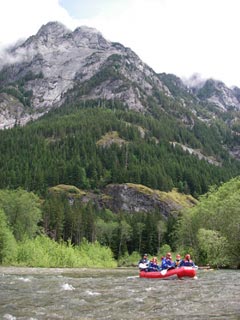 One of the most significant outdoor recreation areas close to metropolitan Seattle is the Middle Fork of the Snoqualmie River. Less than an hour drive from downtown, the valley is accessible to a population of over three million people and attracts visitors from across the country. Few places in the country can boast such an incredible resource that is so accessible. The river feels remote as it winds through a forested river valley largely in public ownership, and it has been proposed for designation as Wild and Scenic by the U.S. Forest Service. A diversity of recreational opportunities are pursued within the boundaries of the watershed.
One of the most significant outdoor recreation areas close to metropolitan Seattle is the Middle Fork of the Snoqualmie River. Less than an hour drive from downtown, the valley is accessible to a population of over three million people and attracts visitors from across the country. Few places in the country can boast such an incredible resource that is so accessible. The river feels remote as it winds through a forested river valley largely in public ownership, and it has been proposed for designation as Wild and Scenic by the U.S. Forest Service. A diversity of recreational opportunities are pursued within the boundaries of the watershed.
The Snoqualmie River itself is popular for whitewater recreation and provides the closest intermediate whitewater to the greater Seattle area. With over 40 miles of whitewater, the river and its tributaries serve a wide range of skill levels with some sections suitable for beginners and others that challenge the nation’s top experts. The best known section is called the “Middle-Middle” that extends from the Dorothy Lake Road bridge downstream to an access point off SE Tanner Road in North Bend.
For local paddlers, the 7.6 mile Middle-Middle run is a popular “escape” that can be paddled on weekday evenings particularly during late spring when the river is fed by snowmelt from the Western Cascades. The river is also popular throughout the rainy season when winter storms provide ample flows for whitewater boating. In addition to many of the region’s paddlers who consider this river their local run, the Middle-Middle attracts paddlers from across the country who come to sample the region’s rich outdoor recreational resources.
Conservation of the Middle Fork Snoqualmie
American Whitewater has served in a leadership capacity on various conservation campaigns for the Middle Fork Snoqualmie River and remains actively engaged in management of the river corridor to protect natural features while enhancing opportunities for the public to enjoy the river.
Middle Fork Snoqualmie Natural Resources Conservation Area
American Whitewater was a leader in the effort to designate the the Middle Fork Snoqualmie Natural Resources Conservation Area (NRCA) in 2011 with the transfer of 9,000 acres from Washington Department of Natural Resources state trust lands (used to generate revenue from timber harvest) into conservation status. The NRCA abuts Mount Si NRCA to create a large forested landscape from the City of North Bend to Mount Baker Snoqualmie National Forest— extending from 800 feet elevation at the Middle Fork Snoqualmie River to 5,000 feet. This conservation landscape protects forests and wildlife habitat while providing opportunities for recreation that include whitewater paddling. American Whitewater served on the planning committee for the Snoqualmie Corridor Recreation Plan published in 2015 that covers this landscape and the recreational opportunities it provides.
Wild and Scenic River Designation
In 2014 the Middle Fork Snoqualmie and Pratt Rivers were designated Wild and Scenic by Public Law No: 113-291, Section 3060 as follows:
- Middle Fork Snoqualmie: The 27.4-mile segment from the headwaters of the Middle Fork Snoqualmie River near La Bohn Gap in NE \1/4\ sec. 20, T. 24 N., R. 13 E., to the northern boundary of sec. 11, T. 23 N., R. 9 E., to be administered by the Secretary of Agriculture.
- Pratt River: The entirety of the Pratt River in the State of Washington, located in the Mount Baker-Snoqualmie National Forest, to be administered by the Secretary of Agriculture as a wild river.
Through the advocacy of the Rivers Council of Washington, a 1990 study by the Forest Service determined the Middle Fork Snoqualmie and its major tributaries were eligible and recommended them to Congress for Wild and Scenic designation. In partnership with the regional conservation community, American Whitewater led the effort to include these rivers in a conservation bill initially introduced by Congressman Dave Reichert in the House followed by Senator Patty Murray in the Senate. American Whitewater was invited to testify on the bill before the House Natural Resources Committee. The Taylor River has also been recommended for designation by the Forest Service and we hope to designate it as a Wild and Scenic River in a future legislative campaign.
Mountains to Sound Greenway National Heritage Area
After several years of effort with our partners, including Mountains to Sound Greenway, we were successful in securing designation of the Mountains to Sound Greenway National Heritage Area in 2019 by Public Law 116-9, Section 6001 (3). The Mountains to Sound Greenway extends from the Seattle waterfront to Kittitas County and the Middle Fork Snoqualmie River valley is at the heart of this landscape. National Heritage Areas are places designated by Congress where historic, cultural, and natural resources combine to form cohesive, nationally important landscapes. A management plan will cooperative framework for management of the landscape across jurisdictions and include various organizations including American Whitewater who was invited to serve on the advisory committee.
Partners
Primary stewardship partners on our efforts in the Middle Fork Snoqualmie include:
